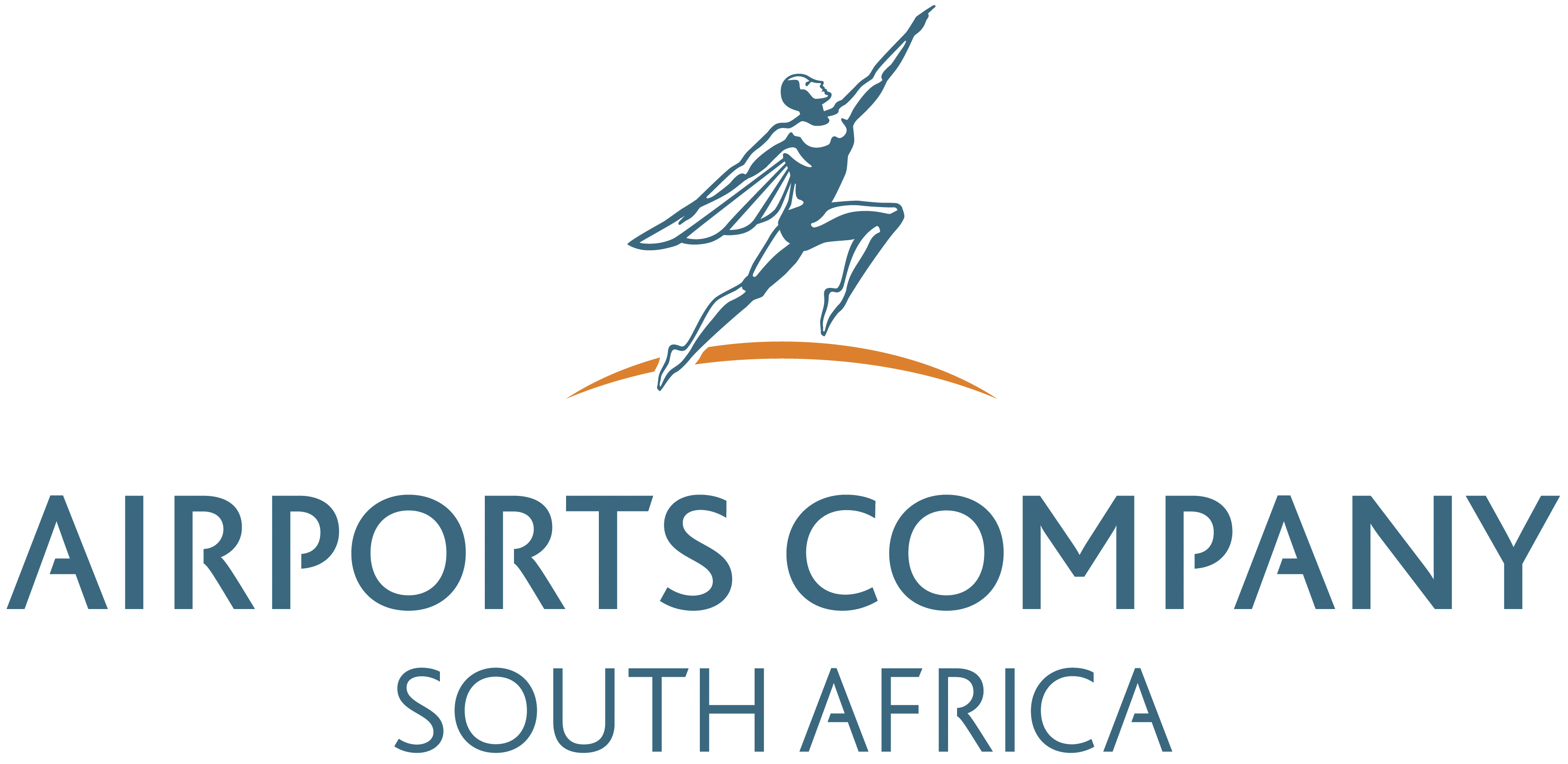MESSAGE FROM THE CEO

Firstly, I am pleased to announce that the ACSA Group has achieved ten out of eleven targets set out in our Corporate Plan for FY2023/24. This year has been one of the most dynamic and challenging financial periods we have navigated, influenced by a range of external factors at both macro-and micro-environment levels, which have impacted our business both positively and negatively.
Ms. Nompumelelo Mpofu Chief Executive Officer
Our positive performance during this reporting period is largely due to the effective implementation of our recovery plan initiated at the start of the Covid-19 health crisis. Our primary focus was on maintaining financial sustainability and aiming to return the entity to relative stability within one to two years post-pandemic. While our performance post- Covid-19 pandemic has been stable and satisfactory, we have faced additional uncertainties due to global geopolitical dynamics, which have introduced new challenges into the already volatile global air travel market.
The sluggish global economic growth, heightened inflation rates and elevated policy rates continue to exert a downward pressure on consumers’ disposable income, creating an unpredictable air travel landscape. Ongoing conflicts in Russia-Ukraine and the Israel-Palestine region have disrupted the global flow of goods and the commodity markets, posing a long-term threat to the free movement of people and goods, especially to and from countries with vested interests in these conflicts. Additionally, we have observed a surge in global oil prices which compelled airlines to hike ticket prices to counter increased expenses.
Furthermore, South Africa’s reduced jet fuel refining capacity has increased operational risks and potential jet fuel supply disruptions due to import delays across our airports. This has significantly affected the aviation industry and airlines operating domestically and internationally.
Despite these ongoing challenges, the global airline industry, according to IATA, reached a significant milestone in February 2024, with passenger traffic levels surpassing pre-pandemic levels by over 5%. However, variations in recovery rates across regions underscore the ongoing imbalances in global economic recovery efforts. The opening of the aviation market in China for international travel, and a strong global demand for leisure travel, brought in some stability.
These developments have contributed positively to our passenger traffic rebounding to 88% of pre-pandemic levels during the reporting period, driven partly by the additional traffic induced by new services originating from both the new and established markets. However, high inflation and fiscal tightening have driven a slowdown in our domestic market, causing local consumers to be cautious about discretionary expenditure. As a result, cuts were made in non-essential consumer spending areas such as air travel.
Despite all the above challenges after significant losses of R2,5 billion in 2020/21, R1,5 billion in 2021/22, and R43 million in 2022/23, ACSA has for the first time since the advent of Covid-19 returned to profitability. This comes on the back of stringent cost reduction measures, voluntary staff reduction, revenue generation, and traffic and route development efforts. We are committed to continuously enhancing our operations and services to meet the evolving needs of our stakeholders and passengers. Our efforts to maintain financial stability and operational efficiency have positioned us well to navigate the complexities of the current global environment.
We appreciate the dedication of our staff, the support and cooperation of all our stakeholders as we work towards sustaining our positive momentum and addressing the challenges ahead.
Infrastructure Investment
In January 2024 the Permission was gazetted which provides a framework for the tariff increase of 6.42% on average and Capital investment of R21.7 billion. This will enable infrastructural investment in Cargo Midfield Terminal at OR Tambo International Airport, Passenger Terminal Expansions in Cape Town, George, Chief David Stuurman and King Phalo Airports. Refurbishment and Upgrading of infrastructure constitutes the bulk of the investments to be made at 93% and Capacity projects are 7% of the total investment over the next fours years. This focus is intended to restore our airport infrastructure to world class standards after the ravishing effects of Covid-19 and to expand our facilities to meet the next decades passenger and trade facilitation requirements and respond to the opportunities including the growth of Air Cargo and the African Continental Free Trade Area.
On digitalisation
Together with the Executive team and broader management of ACSA, we continue to successfully implement most of the action plans agreed upon in the previous reporting period, including relevant asset management and access control policies that govern third parties. This remains a primary focus area for the company, notwithstanding the gaps identified within the internal environment, and some have been closed by the end of the reporting period as of 31 March 2024.
Our digitalisation efforts in the ensuing year include integration of the current information systems to the company with seamless planning processes, more especially in procurement and finance, to efficiently support the business in all transactions and decisions. We are committed to enhancing our IT governance and controls to ensure the security and integrity of our information systems.
On ESG
To strengthen our ESG reporting framework, ACSA has joined the ESG Reporting sub-group of the ACI World Environment Standing Committee. Subsequently, ACI World has published the first edition of ESG Management Best Practices, aimed at addressing common questions from airports seeking to initiate, enhance or expand their ESG reporting. Our involvement in this committee is assisting us in refining our ESG Strategy and reporting framework to meet the evolving needs of our stakeholders regarding performance and risk mitigation, while also fostering an inclusive institutional framework that promotes good governance, compliance and stewardship.
Business threats
The ongoing geopolitical tensions, coupled with persistent low growth and subdued business and investor confidence globally, expose our business to considerable risks, necessitating a cautious approach across all operational fronts. However, the recent Economic Regulatory Permission approval ensuring revenue certainty fills us with optimism regarding our ability to fully rebound from the impacts of the Covid-19 pandemic within the designated timeframe. Our strategic emphasis on the nonaeronautical facets of our operations is of paramount importance, as it holds the potential to significantly transform ACSA, positioning it as a cornerstone of the Southern African economy. Through provision of the essential air transport infrastructure, we are a key enabler for seamless flow of trade and tourism in and out of our country. Serving as a pivotal hub and gateway to various destinations, our goal is to enhance connectivity and regional integration, not only within the country, but also across our continent and the globe.
Additionally, we have seen a recovery in the percentage of black business share of commercial revenue generated, exceeding 55%.
The audit committee, which is independent, promotes accountability and service excellence. It monitors risk management processes, oversees the effectiveness of the internal control environment, including financial and performance reporting, and ensures compliance with legislation. We will work closely with the audit committee in designing adequate action plans for compliance findings and to improve the internal control environment for a significantly improved audit outcome next year.
Most importantly, throughout the reporting period, we have successfully maintained stability in key leadership positions, including the replacement of the position in the Chief Financial Officer in the third quarter of our financial year. This provided the much-needed guidance within the supply chain management function. We continue to struggle with striking the balance between the rate of traffic recovery and resourcing of the organisation especially in the SCM environment, which resulted in 36% vacancy rate by 31 March 2024, which had a significant contributing factor to many the findings highlighted by Auditor General.
We agreed with AGSA on prioritising the SCM environment in our audit scope. We are cognisant of the implication on the company’s financial sustainability and the risk this poses to the company. Thus we have adopted a regular root cause analysis process to identify the real root causes of the SCM findings and implement consequence management as part of corrective measures against non-compliance and irregular expenditure.
Outlook
As we embark on the innovation growth and sustainability journey outlined in our Corporate Plan for the 2025 to 2027 financial years, it is important for us to continue with efforts to respond to the evolving needs of our passengers and operators throughout our network.
We expect the international traffic to remain stable and grow over the Corporate Plan cycle, varying by region. Traffic to and from destinations in Africa is projected to steadily increase, surpassing the 2019 levels by over 9% during the 2024 calendar year. We expect Meetings, Incentives, Conferences, and Exhibitions (MICE) travel segment to continue to be the key driver of revenue and demand for travel, assuming that the aero-political and geopolitical landscape remains relatively constant.
The global air cargo market has proved to be remarkably resilient over the past four periods despite a decline of 1.9% in 2023 compared to the same period last year. The company will be making significant infrastructure capital investments for the refurbishment of the existing Cargo facilities in this year and the largest Cargo investment of R5bn over the permission period through a new world class cargo terminal.
In addition to supporting the recovery of aeronautical revenue, we continue with efforts to diversify our revenue streams and to strengthen our control over the airport operations value chain. These measures will help us mitigate the operational risk and reliance on third-party as it relates to relevant activities at the airport.
To ensure that we remain an employer of choice and reward our staff for their commitment appropriately, we were pleased to be able to restore our employee benefits programme in full during the reporting period.
The company has accepted the invitation to host the 33rd Airport Council International’s Annual General Assembly for Africa from the 16 to 22 of September 2024. The event will take place at our newly constructed convention center at Aviation Park, Western Precinct Building, OR Tambo International Airport.
Thank you for your attention, and we look forward to making significant improvements in the upcoming year.
Ms Nompumelelo Mpofu
Chief Executive Officer

© Copyright 2024 ACSA